Biology:Corallorhiza
| Corallorhiza | |
|---|---|
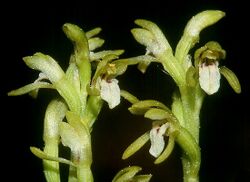
| |
| Corallorhiza trifida | |
| Scientific classification | |
| Kingdom: | Plantae |
| Clade: | Tracheophytes |
| Clade: | Angiosperms |
| Clade: | Monocots |
| Order: | Asparagales |
| Family: | Orchidaceae |
| Subfamily: | Epidendroideae |
| Tribe: | Epidendreae |
| Subtribe: | Calypsoinae |
| Genus: | Corallorhiza Abraham Gagnebin (de) |
| Type species | |
| Corallorhiza trifida Châtel.
| |
| Synonyms | |
| |
Corallorhiza, the coralroot, is a genus of flowering plants in the orchid family. Except for the circumboreal C. trifida,[1] the genus is restricted to North America (including Mexico, Central America and the West Indies).[2][3][4]
Most species are putatively parasitic, relying entirely upon mycorrhizal fungi within their coral-shaped rhizomes for sustenance. Because of this dependence on myco-heterotrophy, they have never been successfully cultivated. Most species are leafless and rootless. Most species produce little or no chlorophyll, and do not utilize photosynthesis. An exception is the yellowish green species Corallorhiza trifida, which has some chlorophyll and is able to fix CO2. However, this species also depends primarily on fungal associations for carbon acquisition.[5][6]
List of species
Many species names have been proposed that are now considered synonyms of other species, or members of other genera. Species accepted as members of Corallorhiza as of (As of January 2023):[7]
| Image | Scientific name | Distribution |
|---|---|---|
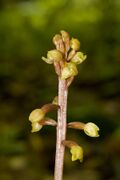 |
Corallorhiza bentleyi Freudenst. | Virginia, West Virginia |
| Corallorhiza bulbosa A.Rich. & Galeotti | Mexico, Guatemala | |
| Corallorhiza ekmanii Mansf. | Haiti, Dominican Republic | |
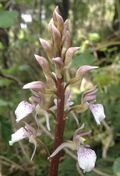 |
Corallorhiza macrantha Schltr. | Puebla, Veracruz, Oaxaca, Guatemala |
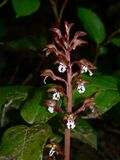 |
Corallorhiza maculata Raf. | widespread across much of Canada, the United States, Mexico and Guatemala |
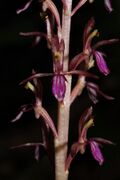 |
Corallorhiza mertensiana Bong. | Alaska, Alberta, British Columbia, Idaho, Montana, Washington, California, Wyoming |
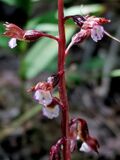 |
Corallorhiza odontorhiza (Willd.) Nutt. | eastern United States and Canada, from Texas to Florida, north to South Dakota, Ontario, Quebec and Maine |
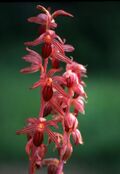 |
Corallorhiza striata Lindl. | much of Canada and Mexico; northern and western United States |
 |
Corallorhiza trifida Châtel | Canada; northern and western United States; widespread across Europe and Asia including Russia, China, Korea, the Himalayas, Ukraine, France, Germany, Italy, Spain, United Kingdom etc. |
| Corallorhiza williamsii Correll | Morelos, El Salvador | |
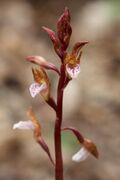 |
Corallorhiza wisteriana Conrad | Mexico and much of the United States |
See also
References
- ↑ Altervista Flora Italiana, Coralloriza, Yellow Coralroot, Corallorhiza trifida
- ↑ Flora of North America, Corallorhiza, v 26 p 633
- ↑ Freudenstein, J. V. 1997. A monograph of Corallorhiza (Orchidaceae). Harvard Pap. Bot. 1(10): 5–51.
- ↑ Gagnebin, Abraham. 1755. Acta Helvetica, Physico-Mathematico-Anatomico-Botanico-Medica 2: 61.
- ↑ Zimmer, K., et al. (2008). The ectomycorrhizal specialist orchid Corallorhiza trifida is a partial myco-heterotroph. New Phytologist 178:2 395-400.
- ↑ Cameron, Duncan D.; Preiss, Katja; Gebauer, Gerhard; Read, David J. (2009-07-01). "The chlorophyll-containing orchid Corallorhiza trifida derives little carbon through photosynthesis" (in en). New Phytologist 183 (2): 358–364. doi:10.1111/j.1469-8137.2009.02853.x. ISSN 1469-8137. PMID 19402877.
- ↑ "Corallorhiza Gagnebin - Plants of the World Online". http://powo.science.kew.org/taxon/urn:lsid:ipni.org:names:328224-2.
External links
Wikidata ☰ Q163537 entry
 |

